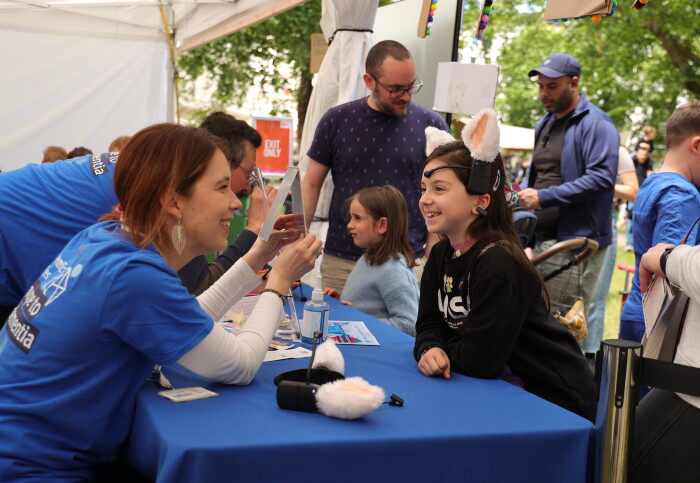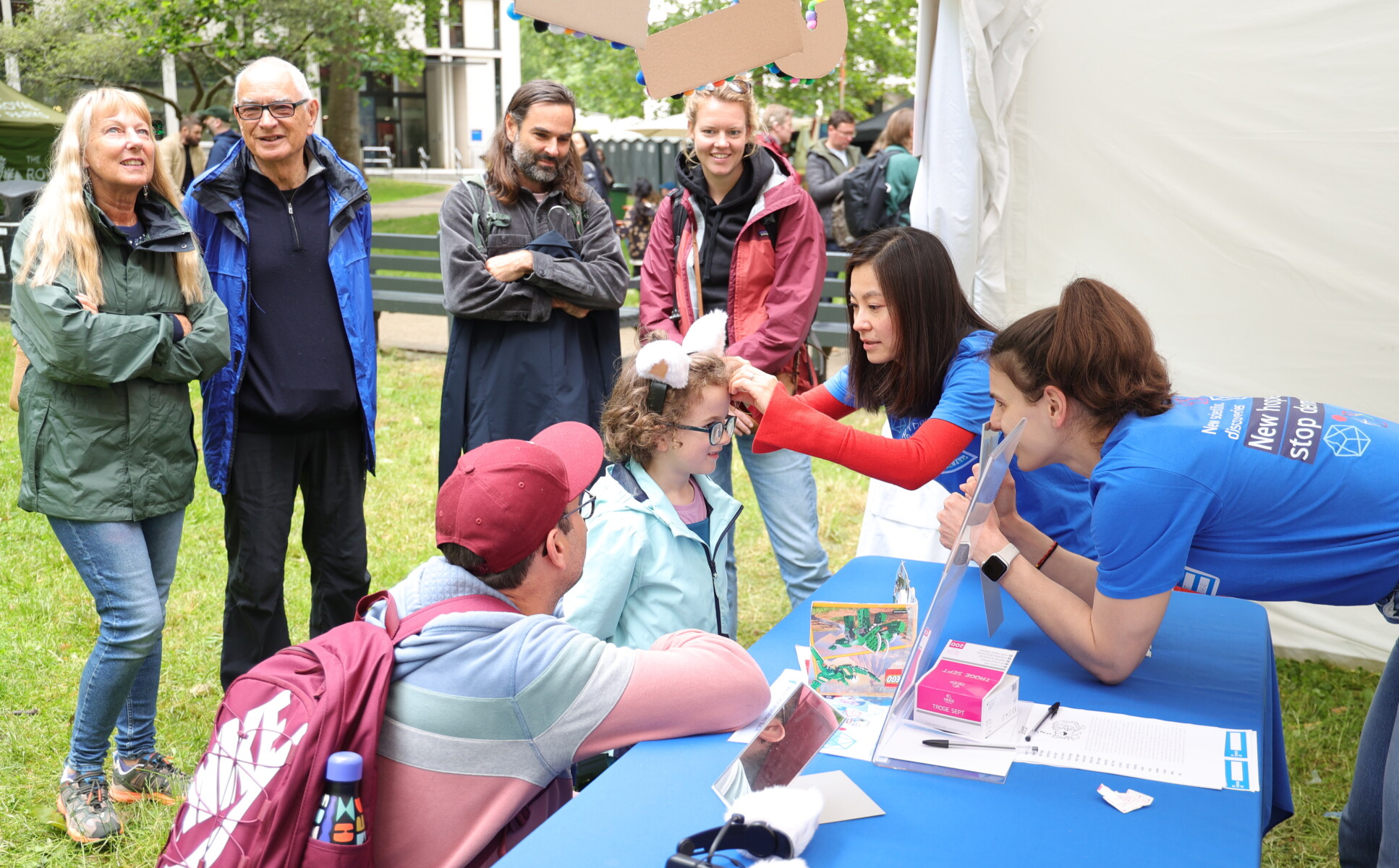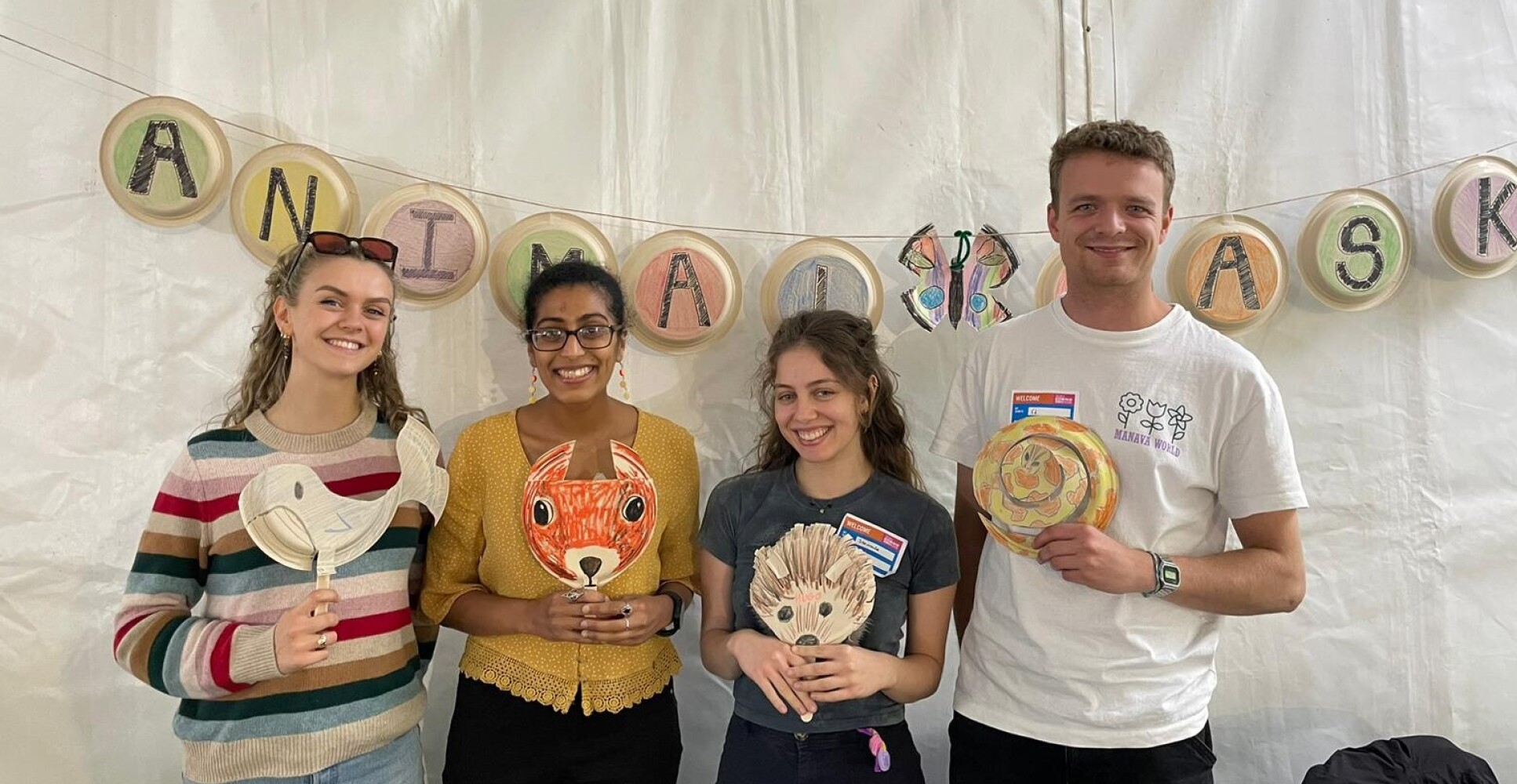Life Sciences thrives at Great Exhibition Road Festival 2024
by Emily Govan

A host of friendly Life Sciences faces popped up at this year’s popular Great Exhibition Road Festival.
Staff and students from across the department inspired the public with a variety of stalls at the annual festival of science which takes place each year in South Kensington.
Annual festival in South Kensington
The Great Exhibition Road Festival is Imperial’s flagship public event, run in partnership with festival partners the Natural History Museum, Royal College of Music, Science Museum, V&A, Royal Albert Hall and many more. It’s a fun, free celebration of science and the arts, with research teams from across the college involved in delivering talks, demonstrations, and exhibits. The event is designed and delivered by Imperial’s central Outreach and Public Engagement teams, led by Professor Maggie Dallman, Vice-President (International).
Our Many Faces
Chloe Coxshall and Katarina Piponi, from Professor Vincent Savolainen’s lab, ran a workshop where the public could contribute their own self-portrait to a giant, shared hanging mobile, which aimed to celebrate diversity and the unique elements that make each of us who we are. Their marquee was transformed into a sea of smiling self-portraits celebrating individualism and the importance of ‘you doing you’. This workshop was developed by inclusion and empowerment artist Liane Harris, joining forces with representatives from across Imperial’s community to create a welcoming space for conversations around identity and self-reflection.
This workshop was developed by inclusion and empowerment artist Liane Harris, joining forces with representatives from across Imperial’s community to create a welcoming space for conversations around identity and self-reflection.
The Science of Sleep
Sara Wong and the Franks-Wisden lab, which is funded partly by the Dementia Research Institute, ran a stall to promote the importance of sleep and sleep hygiene as well as conveying that the brain has dynamic electrical activity that can change depending on sleep/wake states. This was done via three separate areas of the stall: a cat ears EEG headset, an opportunity to design your dream bedroom arts and crafts and a sticker board about how many hours of sleep you get to strike up conversations. 
"Participating in the Great Exhibition Road Festival was an amazing experience to connect with the public - we successfully managed to engage with children and adults alike to convey the importance of sleep." Sara Wong
There was also a collaboration with a local artist Matt Dosa, who translated the importance of sleep into an artwork. The top row represents a good night’s rest, healthily cycling between the stages of sleep and the bottom row represents a fragmented night’s sleep where the cycles are messed up.
Sara said: ‘Participating in the Great Exhibition Road Festival was an amazing experience to connect with the public and we felt we very successfully managed to engage with children and adults alike to convey the importance of sleep. This was a great opportunity for our lab to combine fun and science and everyone including ourselves walked away that day learning something useful whilst having a great time’
Target Malaria
Target Malaria produced a stand featuring various communication tools, such as their card game “Mozzie Drive”, the “Swarm” sonification, live mosquitoes and larvae allowing visitors to come face-to-face with mosquitoes. They also launched their new microinjection game which was trialled at the Imperial Lates event in February. The game was created in collaboration with Michael Marston, a British video game developer, and Louise Marston, one of Target Malaria’s senior research technicians at Imperial. The game allowed the player to enter a simulation laboratory, which has been modelled after our real laboratory, and play a module to experience the process of microinjection. Microinjection is a difficult process that necessitates skills and patience to sort out embryos and then inject them with a DNA solution. You can read more about the stall in this blog.
Animal Masks
Mahika Dixit led the Pearse Lab’s contribution, running a paper plates animal masks stall with over 500 children and families participating, and in the process engaging people with animal adaptations. The stall was met with lots of enthusiasm and creativity from the general public, and even inspired the lab to create their own masks!
Mahika also independently developed a workshop for the Science Cabaret, a new festival event combining science and art for older audiences. Collaborating with award winning artist Laura Melissa Williams, she delivered a storytelling performance and engaged participants with nature via a collaborative art activity, allowing them to experience a day in the rainforest.
 Mahika said: ‘Our audience produced some beautiful, innovative, and interesting collaborative artwork, and in the process engaged with the natural world and the people around them!’
Mahika said: ‘Our audience produced some beautiful, innovative, and interesting collaborative artwork, and in the process engaged with the natural world and the people around them!’
Grantham Climate-Friendly Pop-up Kitchen
The Grantham and Science and Sustainability for a Changing Planet doctoral training program cohort developed a food stall aiming to educate the public about the impact food can have on the environment, showcase some simple and climate-friendly recipes made by professional chefs and provide some resources to families to help them make more environmentally conscious food choices. They handed out 1,500 recipe cards, gave out prizes for games showcasing sustainability, and served almost 3000 people sustainably sourced and prepared food. You can find the recipe cards and info leaflets on the Climate-Friendly Pop-Up Kitchen blog.
Miles Nesbit said: ‘We all had an amazing time discussing the impacts of food choices with the public, educating people, and feeding families!’
Next year
If you would like to get involved at next year’s Festival, please contact e.govan@imperial.ac.uk
Article text (excluding photos or graphics) © Imperial College London.
Photos and graphics subject to third party copyright used with permission or © Imperial College London.
Reporter
Emily Govan
Department of Life Sciences